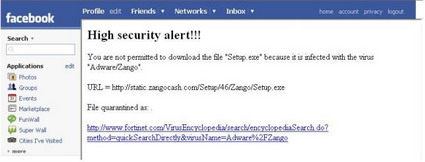Spyware on Facebook: It Was Only a Matter of Time
We all know about spyware and viruses, and how they affect our computers. And we all know Facebook lets you install widgets to your account. Therefore it was only a matter of time before someone created a widget to infect your computer with spyware. Well that time has come.
It might not be the first, but it’s the first time it’s come to my attention. One of the latest Facebook Widgets installs spyware on your computer.
Now before you panic, please note that for the widget to install itself you probably need to actively give it explicit permission past strong warnings! You know those really annoying but important “High Security Alert!!!” messages that a lot of people ignore. They’re there for a reason. Yet people still ignore them. When will we learn?

I guess we’ll never learn. This is social engineering at it’s best.
Permalink to this article Discussions (0)
Now That's Motivation!

It’s amazing how simple things really energize and motive a team. Small simple things can sometimes be incredibly effective. A great example I’ve just read about for the umpteen time came from the latest book I’m reading called The Old New Thing. The book is about the history and evolution of the development of Windows, but importantly there’s one poignant story that sticks out. It’s also referenced in the book Rapid Development as a great team motivational example, and many others. I’ve also read this same story on countless websites and blogs. It’s become folklore. It was very effective!
To quote The Old New Thing:
During the development of Windows 95, application compatibility was a high priority. To make sure that coverage was as broad as possible, the development manager for Windows 95 took his pickup truck, drove down to the local Egghead Software store (back when Egghead still existed), and bought one copy of every single PC program in the store.
He then returned to Microsoft, unloaded all the software onto tables in the cafeteria, and invited every member of the Windows 95 team to come in and take responsibility for up to two programs. The ground rules were that you had to install and run the program, use it like a normal end user, and file a bug against everything that didn’t work right, even the minor stuff. (Of course, you had to provide the program to the person investigating the bug upon request.) In exchange for taking responsibility for ensuring that Windows 95 was compatible with your adopted programs, you go to keep them after Windows 95 shipped. If you did a good job with our two, you could come back for more.
The cafeteria was filled with Windows 95 team members, browsing through the boxes upon boxes of software like bargain hunters at a flea market. And there were the inevitable “What’d you get?” comparisons afterwards.
If Microsoft had decided to keep all the copies of the software they had just purchased for testing I can assure you there would’ve been a lot less enthusiasm in testing as many applications as possible. It would have made more financial sense, why give away everything you just purchased. Especially if you might need to re-test these same software applications when you updated Windows 95, or for future versions of Windows such as Windows 98, etc..
However this simple, very simple, idea of just letting the software developers take home the software they properly tested created great excitement and energy on the team. I have no doubt that if Microsoft had to re-buy all the software afterwards, they still would have been ahead financially with all the extra effort, energy, and goodwill they got.
Frequently in business trying to scrape the bottom line financially isn’t always the best thing. Often it’s worth looking at alternative options. Simple acts can sometimes be more valuable than giant acts.
Permalink to this article Discussions (0)
| « PREVIOUS PAGE |


